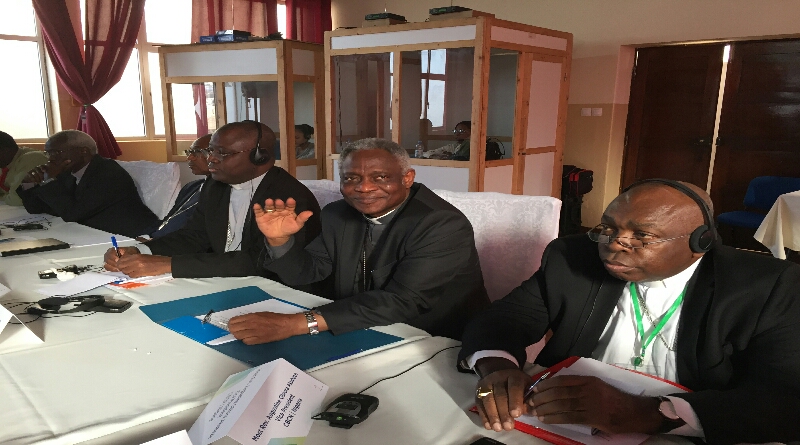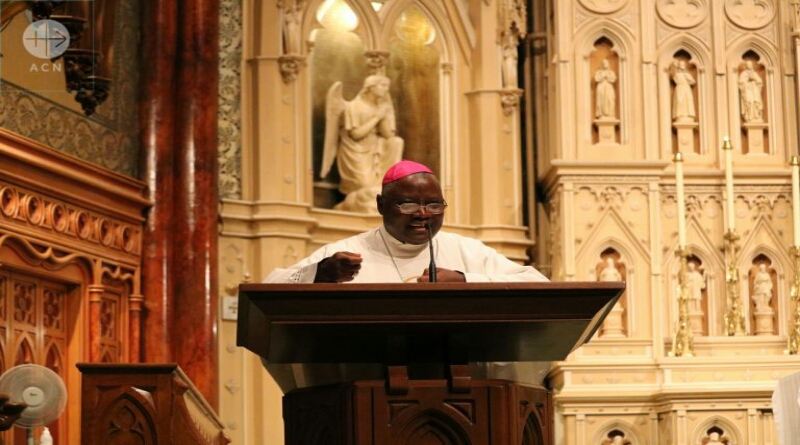THE IMPACT OF BOKO HARAM ON THE CATHOLIC CHURCH IN NIGERIA
THE IMPACT OF BOKO HARAM (ISLAMIC RELIGIOUS EXTREMIST GROUP) ON THE CATHOLIC CHURCH IN NIGERIA
An address to the Catholic Bishops of Brazil in Aparecida, by Most Rev. Ignatius A. Kaigama, Catholic Archbishop of Jos and President, Catholic Bishops’ Conference of Nigeria, 13th April, 2016.
I am very highly honored and privileged to be here among you my brothers in the episcopate meeting in Aparecida, to share with you about the situation of the Church in my country Nigeria. Thank you for your kind and warm reception.
I bring you greetings from my fellow brother Bishops and I pray that this meeting with you will be the beginning of a pastoral relationship and solidarity between your Conference and ours.
Religious extremists have caused untold hardships to millions and have been a threat to the Nigerian nation and also to the practice of the Christian religion especially in the North Eastern part of Nigeria.
I thank the Aid to the Church in Need for not only inviting me to Brazil but also their support to the work of our Catechists, formation of seminarians (who number more than 4,000 today) and Christians who suffer especially in Africa and the Middle East.
ABOUT THE NIGERIAN CATHOLIC CHURCH
The Catholic population in Nigeria is about twenty five million. It is estimated that of the population of 170 million today, Christians number about 40%, Muslims 40% while the remaining 20% practise African traditional religion.
The Catholic Church remains vibrant and growing and is a strong advocate of good political governance. The twin major challenges today in Nigeria are religious extremism (Boko Haram) and corruption. Poverty can be said to be a natural consequence of the two.
Our Church being human and divine, once in a while experiences some ethnic tensions, an example of which is the difficult pastoral situation in Ahiara Diocese where an appointed Bishop has not yet been allowed to take canonical possession of his diocese.
In Nigeria the Church is very involved in pro-life advocacy. She trains and forms people at various levels to detect and resist anti-life lobby and culture infiltrating our country in various directions.
The Catholic Bishops have always supported the anti-corruption campaign of the new government of Nigeria, but we stress that in fighting corruption there must be respect for the rule of law. In our communiques at provincial and national levels we speak out very clearly on burning pastoral and social issues.
The Catholic Bishops’ Conference encourages positive Muslim/Christian relationship especially in Northern Nigeria where workshops, seminars, dialogue and concrete gestures take place often.
In a country of complex cultural/ethnic realities and sometimes confusing political programmes the Bishops continue to be a voice for the voiceless and a beacon of hope and unity.
ABOUT BOKO HARAM IN NIGERIA
Founded In 2002 Muhammed Yusuf this sect evolved from a peaceful search for alternative social empowerment and preaching a new way of being Muslims to violently attacking Churches, government institutions, banks and private businesses.
When their leader was arrested and killed in 2009 the sect went full scale into terrorist activities, first targeted at eliminating anything Christian or “western” as witnessed first by the series of Church bombings and killings and subsequently by the kidnapping and killing of both Muslims and Christians, young and old, men and women.
The Boko Haram in their quest for territorial expansion did control a number of Local Government areas (estimated at 50,000 square kilometers) proclaiming the territory a caliphate and hoisting their flag. Communities had to abandon their homes to sleep in the bushes, to avoid being slaughtered by the band of terrorists.
The camps of internally displaced persons grew at an alarming rate, with women and children clearly the greatest casualties.
Tomorrow 14th April is the second anniversary of the kidnap of the Chibok girls.
The new administration of President Mohammadu Buhari has recaptured the territories with renewed local and international effort. Recently, suicide bombers have attacked mosques and killed Muslims at worship.
Two most affected Dioceses:
THE SITUATION IN THE CATHOLIC DIOCESE OF MAIDUGURI
Bishop Oliver Doeme, the Bishop of Maiduguri Diocese, the epicenter of the Boko Haram activities, made this statement recently:
“over 2,500 Catholic Faithful have been killed. Displaced persons: Over 100,000 Catholic faithful are displaced. Most schools in the Northeast can’t commence regular activities not only because of the terrorists, but also because such school premises now serve as refugee camps. Displaced Priests: Out of the (46) priests currently working in the diocese (26) are displaced.
THE CATHOLIC DIOCESE OF YOLA
Parts of Yola Diocese were attacked by Boko Haram and bombs have often exploded in markets, mosques and crowded areas and even where internally displaced people were being quartered and assisted (four bomb blasts in the last quarter of 2015). The Bishop of Yola (Most Rev. Stephen Mamza) and the Catholic community have been hosts to thousands of displaced people fleeing from Boko Haram assaults. The Cathedral premises became a place of refuge for all and all received equal treatment without discrimination based on tribe or religion. The Bishop of Yola and the Commission of Justice, Peace and Development have been very supportive of displaced people, providing not only shelter, but food and education to some of their children. The displaced people are found in many parts of Nigeria: Taraba State, Plateau State, Abuja and some Eastern and Western States in Nigeria, not sure of when their night mare will end.
A CASE IN POINT: JOS, PLATEAU STATE Is every Muslim a terrorist? No.
I see myself a victim as well as a reconciler, considering that my people and our Church have suffered attacks leading to the death of people as well as the destruction of our churches over the years especially during the bombing of St. Finbarr’s Catholic Church on March 11th in which 14 people died.
The first bomb attack that hindered us from celebrating the 2010 Christmas night preceding the Madalla attack took place in one of my parishes.
Efforts at Peace Building: The Catholic Archdiocese of Jos
Our Dialogue, Reconciliation and Peace Centre opened in 2013 is a neutral forum for dialogue. It is a centre we hope will continue to grow and foster trust, harmony and better understanding not only among Christians and Muslims, but a place where differences of whatever sort can be settles. It is a temple of peace.
Many Bishops are involved in interreligious dialogue and our dialogue commission in the Catholic secretariat has embarked on many laudable initiatives to restore trust between Christians and Muslims and to create religious harmony. Inspite of a few misguided religious fanatics, there is a huge majority that believes in peaceful coexistence and the unity and progress of Nigeria. Hence, our desire to sustain inter religious dialogue despite the inhuman activities of Boko Haram perpetrated in the name of Islam.
Your prayers are kindly needed please for peace in Nigeria. Kindly also pray especially for the liberation of the over two hundred kidnapped school girls who are still not found (tomorrow 14th of April will mark the second anniversary of their captivity).
May I conclude that the Bishops of Nigeria would happily welcome pastoral collaboration with your Conference and would gladly one day also welcome a visit by a delegation of your Conference, as a gesture of fraternity and friendship. Thank you for your kind attention.




